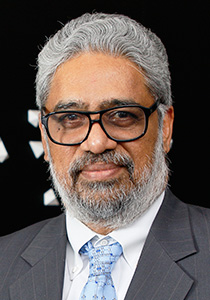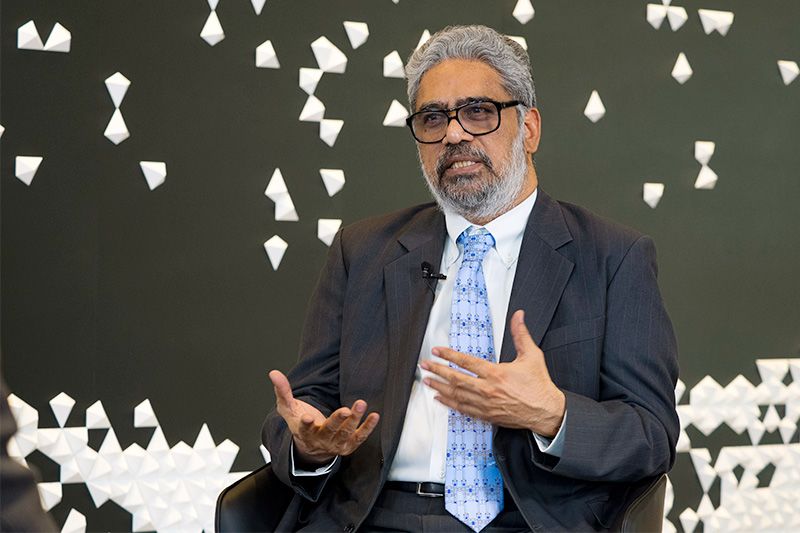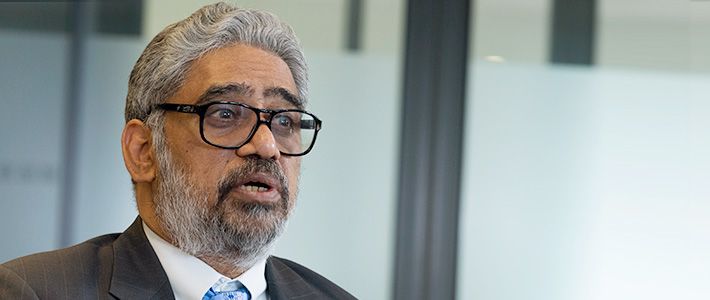
A Positive Review for Indo-Japanese Ties
Politics- English
- 日本語
- 简体字
- 繁體字
- Français
- Español
- العربية
- Русский
After Two Years of Modi
INTERVIEWER Let’s start off with India. We’re two years into the administration of Prime Minister Narendra Modi. How has he done so far?
RAJA MOHAN Prime Minister Modi’s Bharatiya Janata Party won the election on the base of his personal charisma and skill set, and I think his popularity remains quite high.
As with all parties, I think the BJP’s promises were extravagant, so there’s some disappointment, quite clearly, that the reforms have not been as many or as expansive as people had hoped. The prime minister’s emphasis has been on tightening the system, eliminating slack, and trying to make it more efficient, rather than on initiating sweeping reforms.
Some of his efforts to initiate significant reform, like the GST, or Goods and Services Tax, have stalled at the political level. But luckily for him, with lower prices and the general improvement of the manufacturing sector, I think we’ve seen some acceleration of growth.
So India formally, at least, for the last few quarters has been the fastest growing economy in the world, at around 7%. So that has kept up the hope that this government is going to produce, at the end of its term, significant outcomes in terms of where India is headed.
But I would say the most success for this government has been on the foreign policy front. Prime Minister Narendra Modi has brought a new sense of purpose—a new sense of energy—into India’s engagement with the world. And much of the world is looking to see whether he is a person capable of delivering on the promises made. His international stock is very high, and that has worked very well for India’s relationships with most countries.
He has strong support in the lower house of the parliament. In fact, he’s actually the first prime minister in some time with a majority in the lower house. The last prime minister who had such support was Rajiv Gandhi, whose term came to an end in 1989.
So really, for the first time in thirty years you have a prime minister who has a strong presence in the lower house—but it’s in the upper house where his reforms have stalled. [Modi and the BJP] don’t have the majority on their own to move anything in the upper house.
INTERVIEWER Modi came to power soon after Prime Minister Abe Shinzō did for his second term in office and got a lot of attention in the Japanese media for his close relationship with Prime Minister Abe. These were strong top-level ties between Japan and India. Have they strengthened over the past few years?
MOHAN Yes, absolutely. The two prime ministers really injected fresh energy into the relationship. You can trace the improvement in the relationship back to the last decade, when Prime Minister Koizumi Jun’ichirō came to India in 2005—and soon afterward, in Abe’s first term, he visited India as well.
After that there was a series of changes in Japan and things slowed down. But now, you see, there’s strong commitment at the political level on both sides. And I think we’ve significantly expanded the agenda, in economic, political and security affairs, so this is probably one of the best moments in the India-Japan relationship. The potential, of course, is much, much bigger.
Burgeoning Business Connections
INTERVIEWER In economic ties, Japan won the contract to build the bullet train line between Mumbai and Ahmedabad. Is this something that was covered widely in India as well?
MOHAN Of course. It’s the first time India’s given a high-speed train contract. But there was a lot of reticence, too—whether we should do it at all because of the costs of it. An economy like India cannot afford extra. But I think the Japanese made a strong case, and this is really going to be a demonstration project. If it succeeds I think we’ll see a lot more. Of course there are other countries competing for high-speed train contracts, including China.
INTERVIEWER This came soon after Japan lost the contract in Indonesia, when there was a lot of disappointment. Japanese companies are looking at this as a growth opportunity. They want to build out more in India—not just rail, but in all sectors of the economy.
MOHAN India is growing well enough, and Japanese interest has grown. But relative to the possibility, both the trade figures and investment figures are still small. We’ve seen an uptake in investment and trade in the last two to three years, but there’s a lot that needs to be done.
Of course the Japanese companies still feel that the ease of doing business in India is not as it should be. Prime Minister Modi is promising to change that, but at the same time, there is more that India can do to make it easier for Japanese investors.
INTERVIEWER Do you see a lot of interest going the other direction? Is India interested in Japan as an investment destination?
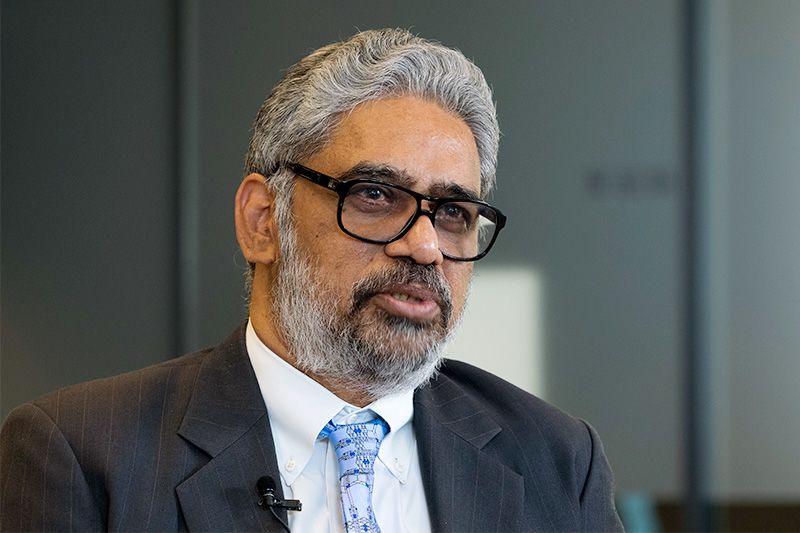 MOHAN Because the Japanese economy is a developed one, I don’t see many Indian investments, although there’s some integration in the IT sector that’s beginning to happen. And if the Japanese liberalize their immigration for more diversification of the labor force, at some point there’ll be more Indian participation. What we’re going to see is the growth potential of India and Japanese capabilities turned into win-win outcomes for both of us.
MOHAN Because the Japanese economy is a developed one, I don’t see many Indian investments, although there’s some integration in the IT sector that’s beginning to happen. And if the Japanese liberalize their immigration for more diversification of the labor force, at some point there’ll be more Indian participation. What we’re going to see is the growth potential of India and Japanese capabilities turned into win-win outcomes for both of us.
INTERVIEWER Are there any sectors of the economy where India is looking specifically for more Japanese investment?
MOHAN The Japanese have played a big role in promoting infrastructure in the rest of Asia, including China. There’s huge potential there, plus a whole range of new ideas. For example, in building new cities, the Japanese are going to be involved in building this new capital city of the state of Uttar Pradesh, a historically Buddhist town. I think there are going to be very interesting contributions from the Japanese.
Japan and India as Part of a Larger World
INTERVIEWER Politically the nations get along quite well. Do you see a lot of progress and cooperation within lager, international frameworks?
MOHAN Absolutely. We’ve restored the trilateral relationship with the United States. There was some discussion of it in the last decade but it kind of fizzled out. Now we engage far more vigorously, meeting at the political level. The ministers meet now.
There are also the joint military exercises that have started again with Japan and the United States. In June, there will be the Malabar exercise taking place in Japan. Then there’s a separate trilateral initiative where India, Japan, and Australia work together, trying to create a framework for expanding cooperation in Asia.
There is a recognition that we’ve got to do more for regional connectivity, regional stability, regional maritime security. In all these areas India and Japan not only work bilaterally; they work in other countries and in multilateral forums.
INTERVIEWER The relationship draws strength and vitality from people from all walks of life. Is there a lot of movement toward building these kind of ties, at the business level, at a student level?
MOHAN I think Modi and Abe both recognize that at the level of the people, contact is not what it ought to be. In terms of student exchanges, in terms of young people traveling, all of that is available potential. So I think this is an area where we need to see a big push.
I’ve also seen that we can invest in strengthening religious culture and spiritual ties. My sense is that in the coming years we’ll see significant growth because there’s just not been enough contact and communication at the popular level.
Two Leading Asian Powers
INTERVIEWER Japan traditionally is held to sort of be a pacifist nation—inward-looking, depending on America for its defense. India has a tradition as militarily isolationist. Do these natures of the countries throw up obstacles to a closer strategic relationship?
MOHAN If you go back to the 1950s, actually there was a lot of warmth between Jawaharlal Nehru, the first prime minister of India, and the postwar Japanese leadership. Unlike many nations, Nehru said look, we should not isolate Japan. And he was quite clear that Japan must play its role—whatever had happened in the war, postwar Japan must be an integral part of constructing a new Asia.
Nehru refused to sign the San Francisco treaty and he did a separate treaty with Japan. He waived any war reparations from Japan. So there was an extraordinary political empathy that came from India, I think, that created very good bonds.
But by the 1960s, we began to drift apart. India drew slowly closer to the Soviet Union and took up its nonaligned, inward-looking policies. Japan became a treaty ally for the United States. These seemed like big differences in terms of how we began to read the world. And because India’s economy was closing down, we couldn’t take full advantage of Japanese growth, which started taking place in the 1960s and 1970s. Everything seemed to drive us apart after the 1960s.
It was really in the 1990s, when India reopens its economy and Japan is looking for a larger role, that we tried to construct a new relationship. Initially there was not much success because of differences on the nuclear issue and a range of other things. But in the last ten years, the India-US relationship improved and Japan also began to take a fresh look at India. We’ve seen a different way of looking at each other. That has been a very productive phase.
So now, for Japan, the alliance issue is not a problem at all because India’s own relationship with the United States is improving significantly. We have this trilateral framework. India, too, is moving away from the nonaligned approach to one where it sees itself as a responsible power that needs to do more for the region and regional security.
This has brought us together in many ways, at a time where China has become very assertive, when you don’t know where America is going or the US domestic politics generate confusion. Today there are far more objective conditions for India and Japan to take larger responsibilities in the region, as well as to work together. As two leading Asian powers, there’s much that India and Japan can do bilaterally, regionally, and with other partners, like the United States and the Europeans.
The China Question
INTERVIEWER When you talk about the trilateral relationship, America and Japan have been very interested in bringing Australia into that as a fourth party. China tends to see this as trying to contain its ambitions in the region. Do you think there is room for Japan and India to work together in the face of a China that’s still a rising power?
MOHAN Look China is the second largest economy and I think all of us will continue to engage the Chinese. But that doesn’t mean we take everything they say as gospel. India sits down with the Chinese and the Russians—so I can’t see why we can’t sit with the Americans and the Japanese also. To say there’s only one way forward—I mean, that’s exactly what the Chinese tell everyone, that everybody must choose their own path of development and their own friends. India is doing the same.
I don’t think that India or Japan is trying to, shall we say, contain China, because China is too big to be contained. But it’s a question of balance, a question of regional stability. Those demand more cooperation between India and Japan—and the United States and Australia.
INTERVIEWER Japan’s ties with India are very strong and going in a very healthy direction. You can’t say the same about Japan’s ties with its neighbors, South Korea and China, where there are some thorny issues to overcome. Do you have any recommendations to Japan on how to build a more constructive relationship with the neighbors?
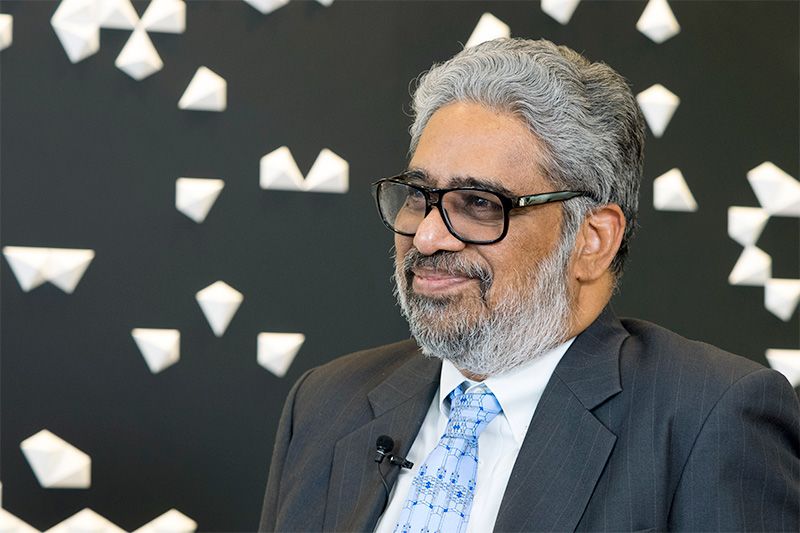 MOHAN Japan has been a good international citizen for more than seventy years since the end of the war. I think it’s quite unfair to constantly make the war a central issue of what Japan ought to do. I think about [the differences between] what our American friends, and the Chinese and the Koreans, say about Japan and the war. The story is not the same in Southeast Asia. And in my own country, one section of our national movement saw Japan as a liberator. So it’s not such a neat story where Japan has to go around the world with an apology in its pocket always.
MOHAN Japan has been a good international citizen for more than seventy years since the end of the war. I think it’s quite unfair to constantly make the war a central issue of what Japan ought to do. I think about [the differences between] what our American friends, and the Chinese and the Koreans, say about Japan and the war. The story is not the same in Southeast Asia. And in my own country, one section of our national movement saw Japan as a liberator. So it’s not such a neat story where Japan has to go around the world with an apology in its pocket always.
I think that phase should come to an end. That’s where Indian Prime Minister Jawaharlal Nehru was very correct in saying, look, we’ve got to move beyond it: there cannot be a stable Asia without Japan playing its full, legitimate role in this part of the world. The time has come for China, Korea, and Japan to look beyond the past and build a new framework. After all, they trade so much and they’re quite integrated. The politics sometimes prevents a genuine transformation of Asia.
An Unpredictable America?
INTERVIEWER Do you see any rough sailing ahead based on what happens with the American election this November, for India, Japan, or the trilateral ties?
MOHAN I disagree with people who think “Americans are crazy,” or “How did they produce a Trump?” Look, it’s a democracy and we shouldn’t forget that. This has come through a democratic process, and my sense is that Mr. Trump reflects a political trend. He’s trying to mobilize the resentments that exist today, especially among those who feel that the United States has spent too much blood and treasure in foreign military misadventures. Those who feel that they’ve been losers in globalization. These people feel that it’s time for a change. The so-called internationalist elite in Washington and the banking elite in New York are insensitive to what’s happening in that country, and I think that’s what we’re seeing.
Populism of the kind that Trump has shown has a long tradition in the United States. It’s not something that has fallen from the moon. He’s very much part of the American tradition and it’s a very decisive moment in the American political evolution. As outsiders, people like us must respect what’s going on. Eight years ago the Americans impressed the world by electing an African American as a president. The American system will throw up surprises, and as outsiders, we have to deal with what emerges.
If the United States decides that they have to reduce their security role, we’re not anyone to tell them that it’s right or wrong—that is an internal debate. But if the US says that after Iraq and Afghanistan they need to lessen their responsibilities, then we have to deal with that situation. That’s where India and Japan must be prepared to take larger responsibilities for security in the region. I’m not saying Japan should write a bigger check for Mr. Trump so that Americans can continue, but when Trump is saying look, Korea and Japan are so rich and they should take a bigger share, I’m sure that’s up for negotiation, assuming he gets elected.
My sense is that we’re at a cusp of a change—that things cannot go on the way they have in the security realm, that the Americans will do all that is necessary and that we all have the right to criticize them when things go wrong. The Americans are asking why, what’s in it for us? That’s an interesting debate. As major countries in this region, Japan and India should be prepared to do more, individually and bilaterally.
INTERVIEWER India in particular is in quite a volatile neighborhood if America does decide it needs to withdraw militarily. Is India prepared, on a regional basis, to leave a footprint there?
MOHAN Definitely. In East Asia, you already have the physical presence of US troops, and in the Middle East, again you’ll see that the US frequently intervened and got involved. If some of that gets reduced, India will have to contribute more to the region’s security. For example, in the Indian Ocean, where India has a strong naval force, we’re able to take on more responsibilities. We’ll be able to support more efforts for peace and reconciliation in the Middle East and to construct a stable balance in East Asia. There, again, I think India and Japan have a huge potential to work together to produce that stability and to work, for example, in the Middle East or in Africa to expand growth and create new opportunities. It’s actually a very exciting moment because there is a reordering of the universe around us taking place. I think this increases the responsibility and the possibilities of both Tokyo and Delhi.
A Message for Japan
INTERVIEWER Do you have a message to deliver to the Japanese, either in the context of how you’d like to see them develop as partners for India or as members of the global community?
MOHAN
As I said, Japan has been a very good global citizen for the last seventy years, and today the world demands that Japan play a larger role. Whatever the debates of Northeast Asia might be, Japan has no baggage in South Asia, in Africa, in the Middle East. People look to Japan, so I think Japan should also look beyond the region. There is a world out there where people have nothing but goodwill for the Japanese. And at a time when the United States seems ambivalent, Japan ought to be able to step up and to take more responsibility. I think there’ll be a lot of support in South Asia, in the Middle East, for a more constructive, more positive Japanese role. (Based on a May 19, 2016, interview in English. Interviewer Peter Durfee is chief of the Nippon Communications Foundation’s English Editorial Dept. Photos © Yamada Shinji)diplomacy security China India Japan-US Abe Modi Japan-India
